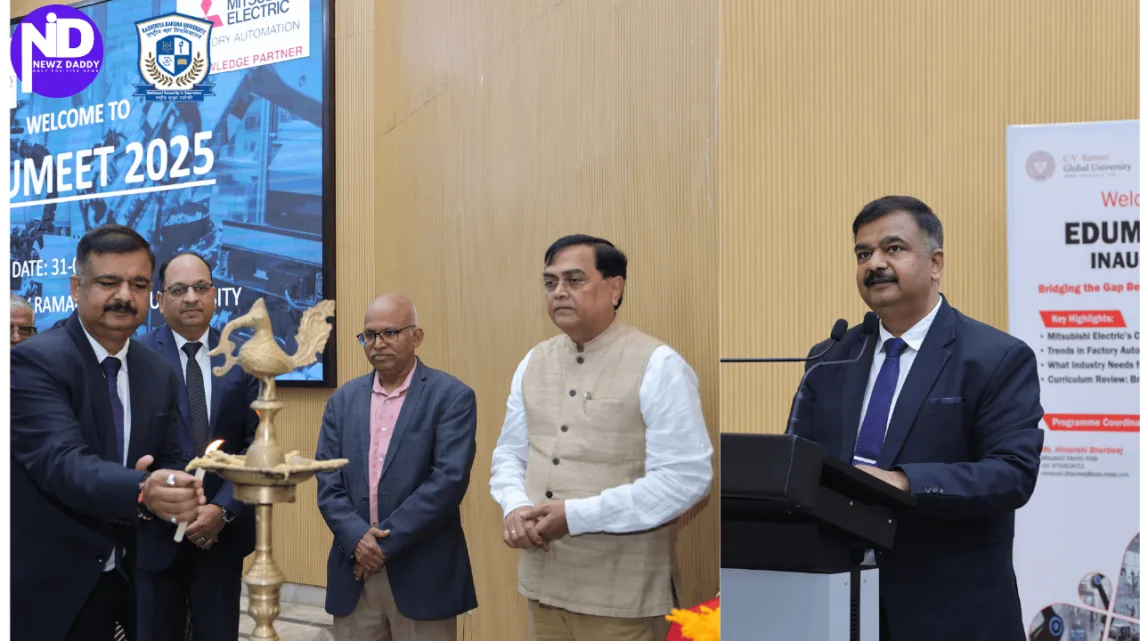Building the Workforce of Tomorrow: Insights from Edu Meet 2025
Newz Daddy Educational Updates
Synopsis of the Article
- Event & Venue: Edu Meet 2025 was held at C.V. Raman Global University, Bhubaneswar.
- Chief Guest: Professor (Dr.) Kalpesh H. Wandra, Pro-Vice Chancellor of Rashtriya Raksha University.
- Host: Professor Banshidhar Majhi, Vice-Chancellor of C.V. Raman Global University.
- Key Attendees: Mr. Sanjib Kumar Rout (Founder & President, CVRGU), Mr. Sunil Mehta (Mitsubishi Electric India), Professor N.S. Das, and Dr. Soumya Mishra.
- Theme: Strengthening industry-academia collaboration for future-ready education.
- Topics Discussed:
- Importance of collaboration between industries and universities.
- Industry expectations from fresh graduates.
- Trends in factory automation, AI, and robotics.
- Professor Wanda’s Address:
- Stressed on bridging the gap between theoretical knowledge and practical industry applications.
- Emphasized AI, ML, robotics, cybersecurity, and sustainable manufacturing.
- Presented a Siemens & RWTH Aachen University case study as an ideal collaboration model.
- Proposed industry-integrated curricula, internships, R&D partnerships, and startup ecosystems.
- Advocated the implementation of NEP 2020 with university clusters for effective execution.
- Outcome: The event encouraged universities and industries to collaborate actively for mutual growth and innovation.
- Never before has the nexus between industry and education been so important. In light of this, the esteemed Edu Meet 2025 was held at C.V. Raman Global University (CVRGU), Bhubaneswar, and brought together leading academics and business executives to talk about the significance of bridging the gap between theoretical education and real-world industrial demands.
Pro-Vice Chancellor of Rashtriya Raksha University Professor (Dr.) Kalpesh H. Wandra was the Chief Guest, and other distinguished dignitaries attended the occasion. Distinguished guests such as Mr. Sanjib Kumar Rout (Founder & President, CVRGU), Mr. Sunil Mehta (Mitsubishi Electric India), Professor N.S. Das (Director, Industrial Automation Centre, CVRGU), and Dr. Soumya Mishra (IQAC Coordinator, CVRGU) attended the meeting, which was chaired by Professor Banshidhar Majhi, Vice-Chancellor of CVRGU.
Building relationships between businesses and academic institutions to better prepare students for the changing labor market was the main topic of discussion. The presenters underlined that although academic institutions provide knowledge, employers anticipate that graduates will possess technological know-how, flexibility, and real-world problem-solving abilities.
In his keynote speech, Professor Wandra noted that academic institutions and companies have operated independently with little connection for many years. However, the necessity for greater collaboration has become evident due to the rapid improvements in technology and the growing reliance on automation, robots, and artificial intelligence.
Companies look for graduates who can use knowledge realistically in addition to having strong academic credentials.
Critical thinking, problem-solving skills, and practical knowledge of automation, robotics, and artificial intelligence are becoming crucial.The conversation focused on how contemporary industries are being shaped by artificial intelligence (AI), machine learning, digital twins, edge computing, and collaborative robotics (Cobots).
Other key areas of concentration include cybersecurity and energy-efficient, sustainable manufacturing.Case Study: Collaboration Between Siemens and RWTH Aachen University
The partnership between Siemens and RWTH Aachen University was cited as an example of how academia and business may effectively collaborate.
Both businesses and students have benefited from the ground-breaking innovations that have resulted from this cooperation.Professor Wandra proposed some doable ways to improve the relationship between industry and academia, such as:
curriculum with industry integration that is in line with practical uses. apprenticeships and internships to gain practical experience. cooperative research and development initiatives to promote creativity.
programs for faculty exchanges to improve the sharing of skills between academics and professionals in the industry. encouraging startup ecosystems and entrepreneurship to foster careers that are driven by innovation. Successful NEP 2020 implementation through the creation of university clusters for improved performance.For educators and business executives alike, the event opened their eyes. Businesses were encouraged to invest in research and training partnerships, and academic institutions were given a blueprint for restructuring their courses to match industrial demands.
The conversation concluded on a strong one, with everyone in agreement that partnerships and ongoing involvement are necessary to guarantee that graduates are prepared for the future and that industries have the skilled labor they require.
Must Read:
RRU Hosts a Visionary Roundtable on CSR and Community Growth




